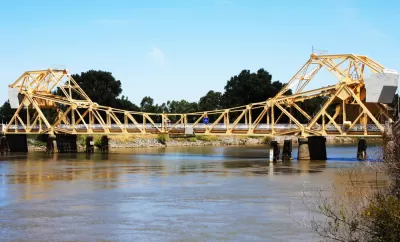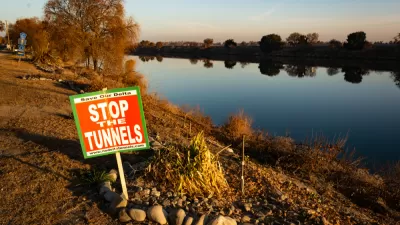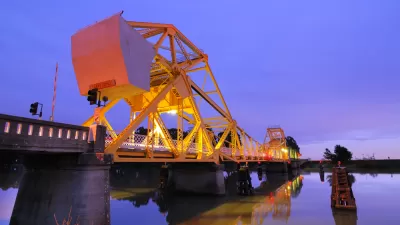The U.S. Fish & Wildlife Service and the National Marine Fisheries Service gave a crucial green light for the intensely controversial and ambitious California WaterFix project, which would pump water around the Sacramento-San Joaquin Delta.

"The Delta tunnels got a crucial green light Monday from two federal agencies, whose scientists said they’ve determined that the controversial project can co-exist with the endangered fish that inhabit the waters of the Sacramento-San Joaquin Delta," report Dale Kasler and Ryan Sabalow.
More specifically, "the U.S. Fish & Wildlife Service and the National Marine Fisheries Service said the $15.5 billion tunnels aren’t likely to jeopardize the continued existence of the Delta smelt, Chinook salmon, steelhead and other threatened species," according to Kasler and Sabalow. The biological opinions, as the reports are called, reversed course somewhat in the months between draft form and final form. An op-ed by Matt Weiser, published in May, used the draft biological opinions to build an argument making just the opposite point: that the project will make life worse for fish.
2017 has long been circled on the calendar as a critical year for the so-called WaterFix project, which in previous iterations this decade has been called the peripheral canal project or the Bay Delta Conservation Plan. A peripheral canal proposal was also defeated by voters in 1982 [pdf].
The article quotes Jeff Kightlinger, general manager of the Metropolitan Water District, who says the release of the biological opinions is a "huge milestone" for the project. Ryan Sabalow reported in December that the state signed off on the project in December, and that construction could begin in 2018.
FULL STORY: ‘Huge milestone’ for Delta tunnels – feds say they won’t push fish over the brink

Planetizen Federal Action Tracker
A weekly monitor of how Trump’s orders and actions are impacting planners and planning in America.

Maui's Vacation Rental Debate Turns Ugly
Verbal attacks, misinformation campaigns and fistfights plague a high-stakes debate to convert thousands of vacation rentals into long-term housing.

Restaurant Patios Were a Pandemic Win — Why Were They so Hard to Keep?
Social distancing requirements and changes in travel patterns prompted cities to pilot new uses for street and sidewalk space. Then it got complicated.

In California Battle of Housing vs. Environment, Housing Just Won
A new state law significantly limits the power of CEQA, an environmental review law that served as a powerful tool for blocking new development.

Boulder Eliminates Parking Minimums Citywide
Officials estimate the cost of building a single underground parking space at up to $100,000.

Orange County, Florida Adopts Largest US “Sprawl Repair” Code
The ‘Orange Code’ seeks to rectify decades of sprawl-inducing, car-oriented development.
Urban Design for Planners 1: Software Tools
This six-course series explores essential urban design concepts using open source software and equips planners with the tools they need to participate fully in the urban design process.
Planning for Universal Design
Learn the tools for implementing Universal Design in planning regulations.
Heyer Gruel & Associates PA
JM Goldson LLC
Custer County Colorado
City of Camden Redevelopment Agency
City of Astoria
Transportation Research & Education Center (TREC) at Portland State University
Jefferson Parish Government
Camden Redevelopment Agency
City of Claremont





























